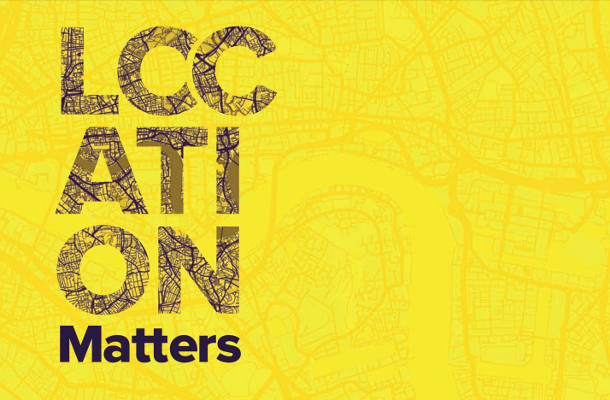
Why Location Still Matters in 2018

Mindshare’s recent report, Location Matters, delves into themes that chime with the times we’re living through in interesting ways. A UK-based report that can easily be applied to other markets, it explains how a national brand can feel relevant to very diverse communities within a country, whether national communications should be integrated with precise, location-based messages and how explicitly location should be referenced to in messaging.
The launch of Location Matters coincided with an event in London where figures from the media, consultancies and brands discussed its implications and shared lessons on how they wade through the ocean of location data to emerge with insights that they can put to use in marketing more effectively.
LBB’s Alex Reeves checked in with Mindshare’s chief business officer David Walsh and futures director Jeremy Pounder to reflect on what they’ve learnt from the report and event.
LBB> What takeaways particularly stick in your mind from the event?
David> I think mine was that people talked about audience movement, about passions and interests, about behavioural insights - what people did or didn’t do in certain regions, in competitive landscapes.
And the ability to test hypotheses, looking at the data. Waze were talking about the power of that data from a community social purpose perspective. I think that demonstrated more about what you can understand about human behaviour and what you can derive from all that data to talk about why people do certain things, move from A to B and buy certain brands versus other brands.
Jeremy> We try and balance the technological side of advertising and all the things that are now made possible because of mobile and ad tech and so on with the fundamental, enduring aspects about people’s behaviour and sometimes the less rational aspects of that.
We were quite keen to dial up the idea of social proof. And the idea that within your messaging and how you construct a local message, you can try and communicate the idea that’s for a group of people, rather than necessarily hyper targeted.
All the attention around location naturally goes to the cutting-edge part of it and a lot of that is about hyper personalisation, but we wanted to try and draw out the point of thinking about how people engage with their local community and how you can craft a piece of communication that makes people feel like they’re receiving it as part of a group - that’s actually quite an important dimension that often gets overlooked.
David> As a business and certainly as an industry we talk a lot about personalisation from a one-to-one marketing perspective. People still feel part of tribes with people we connect with. The power of that type of communication is still really important. Sometimes, looking outside the London bubble that many people here work in, I think you get a different perspective in terms of what community really means to people.
LBB> How would you explain what you’ve learnt to someone completely outside of the ad industry?
David> There’s still a sense of attachment to where people are from. Although lots of us talk about fragmented societies, if I was in a pub talking to my mates I’d say a lot of the research and understanding is actually that a sense of place and belonging is still really important.
If you were thinking about how to connect to those people and really understand the type of behaviour you’re looking to change, that will inform the way you talk to them, whether that’s directing [certain messaging] to a specific location or trying to connect on a broader level about how communications connect to a broader community perspective.
LBB> How would you advise brands to draw on these insights?
Jeremy> One is trying to work out the balance that you want to achieve between portraying a consistent brand message - the same communication across the country - and to what extent should you be looking to provide much more localised communications which are often more performance orientated. I guess that’s why we developed the two-by-two grid [see below] about different approaches and ways of thinking about marketing strategies.

The balance between national and local is quite complex. So think about exactly what you’re trying to achieve and therefore which balance of strategies is most appropriate for you.
Another theme that brands need to think about is thinking about local beyond just the mobile. Obviously that’s the source of a lot of location data in terms of the end consumer, but as a business they will typically have access to other forms of location data that can be used to then adapt what they want to do locally. That could be as prosaic as the weather, which can be used to make decisions about whether you should or shouldn’t be advertising, or maybe which products you want to talk about. Or even just referencing the fact that it’s raining might make a message more resonant.
Another piece of data is which products are selling particularly well in that location, what can you glean from your data about sales performance about what people’s tastes are in a particular region or what’s different about why type of products they like and therefore how can you then maybe use that to make a communication more relevant to a particular local audience?
David> One thing the level of granularity of messaging. I would encourage brands to test things, whether in market or with consumers, just to understand their level of response, thinking about the level of granularity and what people find creepy or what people might find serendipitous. Part of what I’d really like to get people to think about is how you can test this stuff. The ubiquity of mobiles and digital communications allows you to test things very rapidly and get clear feedback from consumers as to their response and the effectiveness of some of those communications. I’d definitely encourage people to think about a hypothesis. Why do people believe something should work?
LBB> It’s clear how this thinking applies clearly to media strategy. But how should creatives respond to this thinking in devising campaigns?
David> One element for creatives to think about from a national level is how localised the marketing could or should be from a messaging perspective and how whatever the bigger idea is translates into something very localised.
One part of it is more performance led, how you can do a dynamic piece of creative depending on who’s there, right time, right message, etc., thinking about all those signals that Jeremy talked about. How do you do that at scale and do it economically? That’s one side. I think the other side is a broader debate: is there a role for localised creative? And if so how does that reinforce or add to what you’re doing nationally?
LBB> That’s in interesting thought. Do you think there’s also a role for localised creatives, with creative agencies having distributed offices in parts of the world outside of big industry hubs?
Jeremy> Definitely. It’s an industry-wide issue, but I think particularly for the creative community, when you’re looking to try and bring to life an idea that resonates with people from all sorts of different backgrounds. It touches on the point about diversity in the workplace but also just in terms of day-to-day experiences. If everyone’s living similar lives in London then it’s difficult to fully understand how your creative idea might be perceived by an audience which might be very different to you, or even the same type of person as you but from a different part of the country.
David> You’ve seen over the years lots of media companies build up a presence outside of London. As part of groupM, we’ve got a big presence in Manchester, Birmingham, Leeds and Scotland. Having people on the ground understanding the local communities is particularly important, particularly for some of the brands that have a massive presence up North.
Jeremy> You’re trying to reflect cultural behaviours and demonstrate either through language or through the idea, everyday life. It’s important for all aspects of the industry but probably particularly so within the creative community.













